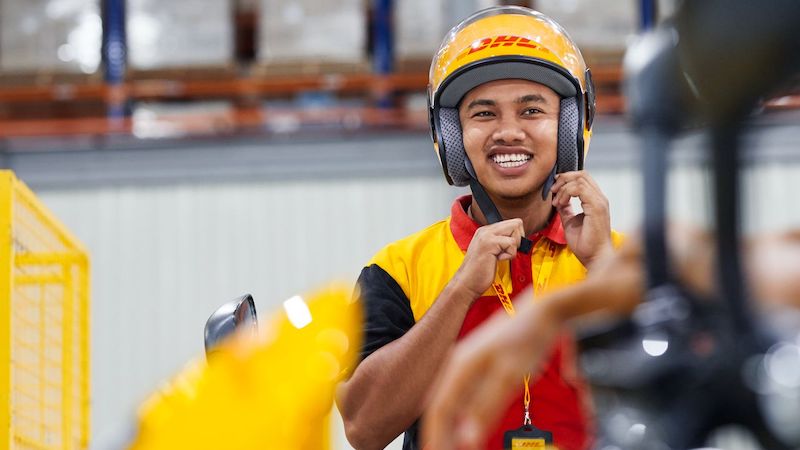Grow your business with the Discover newsletter
Logistics advice & insights straight to your inbox
Subscribe now
When consumers talk about delivery of a product, what often comes to mind is its journey from your facility to their doorstep. Business owners, however, know that this is just one part of the entire delivery and fulfilment process – namely, the portion referred to as “last mile delivery”.
But just what is last mile delivery and how does it differ from first mile delivery? Furthermore, why is it so important to your business’ long-term success? Knowing the answers to these questions will help you shape your operations so that you can streamline day-to-day logistics, boost customer satisfaction, and attain long-term customer loyalty.
Last mile delivery refers to the final leg of the delivery process. It usually begins at a transportation hub (such as a parcel sorting facility or regional hub) and ends at the final destination of the customer's home or business address. This is in contrast to first mile delivery, which covers the journey of the product from its warehouse, factory, or supplier to the transport hub.
Though it only covers the final part of the product’s overall journey and can even take a shorter duration compared to manufacturing and production, last mile delivery is often termed the ‘last mile problem’ by those in logistics.
Simply put, last mile delivery has gained the above epithet as it is considered the most challenging aspect of the entire logistics and delivery process. This is due to the complex, variable, and sometimes unexpected factors that have the potential to disrupt or even ruin it.
For example, once your courier has left the transportation hub with a package in hand, they are subject to unpredictable delays and disruptions such as traffic congestion, needing to navigate busy streets, and finding the right delivery location. At the same time, the courier needs to ensure that the transport journey does not break, dislodge, or disrupt what’s inside the package. This is especially important if your company’s main product offerings involve consumables, fragile objects, or time- and condition-sensitive items such as essential medicine.
In a situation where the package does arrive damaged, this can incur further costs for your business due to return logistics, refunds, or other customer follow-up techniques to smooth over the transaction and placate an upset customer. If these techniques involve return logistics or your business needing to re-deliver a parcel, the last mile problem can rear its ugly head all over again – creating endless frustration on both your and the customer’s ends.
As hinted to above, last mile delivery’s greatest relevance to business success is the fact that it’s the part of the delivery process that directly involves your customers. Reliable and timely delivery leads to increased customer satisfaction, which can have positive impacts on brand recognition and reputation. Conversely, if a company consistently delivers a poor last mile delivery experience to customers, it might even be enough to turn customers away in search of competitors with better customer service.
However, this does not mean that last mile delivery is an impossible problem to surmount. With the right day-to-day operations and processes in place, you can guarantee a fuss-free, reliable, and consistent last mile delivery that boosts customer satisfaction and brand loyalty.
Improving your last mile delivery solutions also gives you a competitive edge by allowing you to keep up with rapidly changing consumer expectations. According to a 2022 article by ZS, as high as 85% of consumers would not pursue future purchases with brands that had delivered a poor shipping experience. In an increasingly saturated market, having stand-out last mile delivery can enable you to capture customers’ goodwill and recognition in order to ensure longevity for your customer base and brand.
There are many ways businesses in Indonesia can optimise the last mile delivery process, from implementing new technology to improving relationships with third-party courier and logistics providers.
In today’s technology-driven landscape, there are endless technology- and digital-based ways for businesses to improve their delivery process. This could mean real-time carrier tracking and monitoring of deliveries, using geolocation to predict and identify the most efficient delivery routes, or AI-driven warehouse management systems that ensure the right parcels are sent out at the right time.

However, technological innovations can only get you so far if your delivery partners are not able to make the most out of them. That’s where partnering with a trusted and reliable logistics and delivery partner like DHL Express comes into the picture.
DHL Express is a leading provider of last mile delivery worldwide, including value-add delivery options such as same-day and urgent delivery services. Our platform is designed to help businesses and customers alike enjoy a smooth and worry-free delivery experience, with plenty of integrated features to streamline the delivery process even further. This includes end-to-end visibility of shipments, non-standard pick-up requests, and Saturday delivery to cater to customers’ unique needs. Our couriers can also provide dedicated pickup and delivery services as specified by you or your customers, as well as emergency services for sudden crunch times such as the peak sales seasons during Ramadan and other holidays or festive events.
Find out how we can help you improve your last mile delivery solutions by applying for a DHL Express account today.